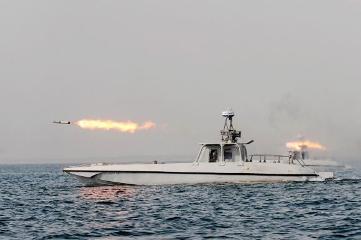Iran Stops Exporting Oil to British, French Companies as Tension Increases
Iran halted crude sales to French and British buyers to pre-empt a European Union ban on imports of its oil, just as OPEC’s second-biggest producer negotiates supply contracts with China.
Iran “will give its crude oil to new customers instead of French and U.K. companies,” the oil ministry’s news website Shana reported, citing Alireza Nikzad Rahbar, a ministry spokesman. France got 4 percent of its oil imports from Iran in the first half of last year, while the U.K. bought 1 percent, according to the U.S. Energy Information Administration. Iran will increase the volume of crude it ships to China “soon,” state-run Mehr news agency reported Feb. 16.
Iran is suspending exports as tension rises in the Gulf over its nuclear program, helping send oil prices to the highest level in nine months. The EU and U.S. have imposed additional sanctions against the country, restricting trade and financial transactions. Iran, the second-largest producer in the Organization of Petroleum Exporting Countries after Saudi Arabia, is also under four rounds of United Nations sanctions.
Iran threatened to halt oil shipments to Italy, Spain, Portugal, Greece, France and the Netherlands when it summoned their ambassadors to the Foreign Ministry on Feb. 15 to protest the EU’s punitive measures, state media reported. Iran would end sales of crude to the six countries unless they agreed to long- term contracts and payment guarantees, state-run Press TV reported that day, without citing anyone.
Oil Prices
EU nations together bought 18 percent of Iran’s exports of crude oil and condensates, or 452,000 barrels a day, in the first half of 2011, according to the most recent data from the EIA.France purchased 49,000 barrels a day in the first half of last year, while the U.K. took 11,000 barrels a day.
The export halt by Iran could “prompt further prices gains for crude,” John Caiazzo, president of Acuvest Commodity Brokers Inc. in Temecula, California, said in a note to clients today.
Oil for March delivery rose as much as $1.97 to $105.21 a barrel in electronic trading on the New York Mercantile Exchange, the highest intraday price since May 5. Prices increased 4.6 percent last week and are up 6.1 percent this year.
BP, Total
Total SA (FP), France’s largest oil company, has stopped buying Iranian crude, Chief Executive Officer Christophe De Margerie told Bloomberg TV in a Jan. 27 interview in Davos. Telephone calls for comment to the French foreign ministry were unanswered yesterday.
An official for Royal Dutch Shell Plc (RDSA), the biggest European energy company, said she had no comment when Bloomberg contacted her by phone in London, declining to be identified becasue of company policy. BP Plc (BP/) doesn’t buy Iranian crude, David Nicholas, a London-based spokesman, said by phone.
Iran produced 3.545 million barrels a day of crude in January, according to data compiled by Bloomberg. Iranian exports in 2010 averaged 2.154 million barrels a day, EIA data showed.
China Contract
China and Iran have agreed on pricing and sales methods for a supply contract, Mehr reported, citing an unidentified official at National Iranian Oil Co. A NIOC official at the company’s Singapore crude marketing office, who asked not to be identified in line with company policy, declined to comment on the report.
Iran was in talks last month with China International United Petroleum & Chemical Corp., the nation’s biggest oil trader, over that company’s 2012 crude supply contract, two people with knowledge of the talks said Jan. 10. The agreements between the buyer, known as Unipec, and National Iranian Oil Co. were scheduled to be agreed on last year, according to the people, who declined to be identified because the information is confidential.
China buys 22 percent of Iran’s exports, according to the EIA.
Related Posts
Latest News
-
FCMB Bank (UK) Limited Launches Personal and Business Banking Proposition to Deepen Inclusiveness
FCMB Bank (UK) Limited, an independently incorporated subsidiary of First...
- Posted August 1, 2018
- 0
-
The Worrisome Trend of Sensational Social Media “Journalism” and the Impact On Legitimate Business Concerns: Recent Travails of FCMB, GTBank and First Bank
On June 25, 2018 I woke up to yet another...
- Posted June 26, 2018
- 0
-
FCMB attains ISO Certification for Quality Management
Leading financial services provider, First City Monument Bank (FCMB), has...
- Posted May 16, 2018
- 0
-
Over 1,000 firms bid for 2017 railway projects
Over 1000 companies expressed interest in 17 categories of projects...
- Posted October 20, 2017
- 2
-
NAICOM moves to enforce compulsory insurance of public buildings
To drive the enforcement of the compulsory insurance of public...
- Posted October 20, 2017
- 11
-
Reps ask NPA to reverse termination of agreement with Intels
The House of Representatives yesterday waded into the ongoing controversy...
- Posted October 19, 2017
- 1
-
SEC suspends Oando shares from stock market
The Securities and Exchange Commission has ordered the Nigerian Stock...
- Posted October 19, 2017
- 1
-
FCMB Bank (UK) Limited Launches Personal and Business Banking Proposition to Deepen Inclusiveness
FCMB Bank (UK) Limited, an independently incorporated subsidiary of...
- August 1, 2018
- 0
-
The Worrisome Trend of Sensational Social Media “Journalism” and the Impact On Legitimate Business Concerns: Recent Travails of FCMB, GTBank and First Bank
On June 25, 2018 I woke up to yet...
- June 26, 2018
- 0
-
Azman Air commences flight operation in Sokoto
Azman Air Thursday commenced flight operation to Sokoto state....
- February 21, 2015
- 424
-
NRC increases Lagos goods trains, eyes fuel haulage
The Nigerian Railway Corporation says it has increased its...
- June 23, 2016
- 100





